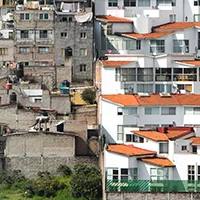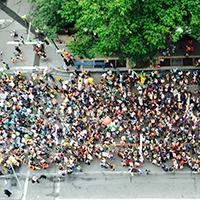Research
Our research is broadly organised into five main programmes and one cross-cutting observatory.
Programmes

The Economics of Environmental Inequality
This programme examines the interconnections between environmental change, inequality, and environmental policy. It examines how climate impacts and policy responses are distributed across countries, regions, and social groups, and how these inequalities shape both vulnerability to climate risks and the political feasibility of climate action.

Gender Justice and the Wellbeing Economy
This programme brings together an interdisciplinary core team and a wider network of scholars and activists in order to articulate the role of gender justice in the wellbeing economy through a focus on three thematic areas: an analysis of the problem, the conceptualization of alternatives, and the construction of an agenda for change.

Opportunity, Mobility and the Intergenerational Transmission of Inequality
This programme brings together interdisciplinary perspectives, ideas and findings on horizontal inequalities and intergenerational transmission of well-being. It explores how inequality of opportunity links to inequality of outcomes and intergenerational transmission (immobility): when opportunities for today’s children are very unequal, their lives as adults are bound to be very different.

This programme focuses on research themes and questions that concern perceptions of, and attitudes towards, the diverse forms of inequality - such as income, health, and education. Members of the research programme are involved in the study of distributional values and preferences, including behavioural determinants that can explain differences in inequality preferences across societies and social groups.

Wealth, Elites and Tax Justice
This programme analyses wealth as a fundamental driver of inequality dynamics, ranging from the global down to the urban scale. Our team examines how wealth inequality affects the politics of taxation, the entrenchment of race and gender divides, and the renewed significance of inheritance and elites.
Global Inequalities Observatory
The Global Inequalities Observatory seeks to promote rigorous research methods from a wide range of social sciences to foster a greater understanding of the levels, trends, causes, and consequences of economic inequality in multiple countries and regions. Learn more about the Global Inequalities Observatory projects below.

The India Observatory develops and enhances research related to India's economy, politics and society. Theme members work in collaboration with international partners for the generation and exchange of knowledge on India and its position in the world It is, especially with respect to emerging economies.

Latin American and Caribbean Inequality Review
The Latin American and Caribbean Inequality Review explores why, despite major structural economic and social change, inequality in Latin America and the Caribbean persists at exceptionally high levels. Understanding the nature, causes and consequences of Latin America’s stable high-inequality equilibrium may provide a basis for action intended to make the region more equitable.

Measuring multidimensional employment deprivations in middle income countries
Being employed does not guarantee a basic standard of living or well-being. Therefore, it is important to measure not just the quantity of employment, but the quality of employment. The objective of this project is to re-examine existing approaches to Quality of Employment and provide a coherent theoretical framework for it.

Research under the SOUTHMOD project aims to promote the use of microsimulation models to analyse the impact of different tax-benefit policy reforms on household incomes and government revenues in the Global South. The project represents a major international collaboration between LSE, UNU-WIDER, the Southern African Social Policy Research Insights (SASPRI), and researchers from the low- and middle-income countries for which the models have been built.

Sustainability Performances, Evidence and Scenarios (SPES)
The Sustainability Performances, Evidence and Scenarios (SPES) project addresses the interconnections between economic growth, human flourishing, and sustainability. The overall goal of the SPES project, is to contribute to the transition towards sustainable human development in European countries and regions.

The Luxembourg Income Study (LIS) database is the largest available income database of harmonised microdata from approximately 50 countries, spanning five decades. The UK LIS Satelite Office aims to promote the use of the LIS databases and serve as the point of liaison between LIS and the community of LIS data users in the UK.
Networks
The III networks are former research programmes that continue to be active in research, collaboration, and impact in their subject area.

Cities, Jobs and Economic Change
This network takes an internationally comparative, cross-disciplinary, and multidimensional approach to analysing economic and technological change, polarised labour markets, and geographic divides in education, employment opportunities, political attitudes, and cultural values. It engages quantitative and qualitative researchers to understand both broad economic processes and everyday lived experiences.

This network highlights the role of care as an economic driver of value by centring the significance of feminist debates and social reproduction analysis to inequalities research. It unveils the hidden value of care right from within the household to across the global economy, from domestic and care labour to planetary care.

This network explores the practices of resistance, mobilisation, and contestation which constitute a politics of inequalities from a bottom-up perspective. Research within this network has an international and comparative focus, adopting an intersectional lens to explore collective action and everyday resistance against various social, cultural, economic and political inequalities.

Public Economics of Inequality
This network goes beyond the measuring of income and wealth inequality by focussing on new data opportunities and methodological advances to provide a more comprehensive account of the distribution of welfare. This allows for better understanding of underlying mechanisms of inequality and for the creation of policy that tackles inequality more effectively.